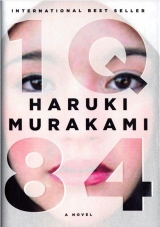
Текст книги "1q84"
Автор книги: Haruki Murakami
Жанр:
Современная проза
сообщить о нарушении
Текущая страница: 22 (всего у книги 81 страниц)
Walking to the subway, Aomame kept thinking about the strangeness of the world. If, as the dowager had said, we are nothing but gene carriers, why do so many of us have to lead such strangely shaped lives? Wouldn’t our genetic purpose—to transmit DNA—be served just as well if we lived simple lives, not bothering our heads with a lot of extraneous thoughts, devoted entirely to preserving life and procreating? Did it benefit the genes in any way for us to lead such intricately warped, even bizarre, lives?
A man who finds joy in raping prepubescent girls, a powerfully built gay bodyguard, people who choose death over transfusion, a woman who kills herself with sleeping pills while six months pregnant, a woman who kills problematic men with a needle thrust to the back of the neck, men who hate women, women who hate men: how could it possibly profit the genes to have such people existing in this world? Did the genes merely enjoy such deformed episodes as colorful entertainment, or were these episodes utilized by them for some greater purpose?
Aomame didn’t know the answers to these questions. All she knew was that it was too late to choose any other life for herself. All I can do is live the life I have. I can’t trade it in for a new one. However strange and misshapen it might be, this is it for the gene carrier that is me.
I hope the dowager and Tsubasa will be happy, Aomame thought as she walked along. If they can become truly happy, I don’t mind sacrificing myself to make it happen. I myself probably have no future to speak of. But I can’t honestly believe that the two of them are going to have tranquil, fulfilled lives—or even ordinary lives. The three of us are more or less the same. Each of us has borne too great a burden in the course of our lives. As the dowager said, we are like a single family—but an extended family engaged in an endless battle, united by deep wounds to the heart, each bearing some undefined absence.
In the course of pursuing these thoughts, Aomame became aware of her own intense urge for male flesh. Why, of all things, should I start wanting a man at a time like this? She shook her head as she walked along, unable to judge whether this increased sexual desire had been brought about by psychological tension or was the natural cry of the eggs stored inside her or just a product of her own genes’ warped machinations. The desire seemed to have very deep roots—or, as Ayumi might say, “I want to fuck like crazy.” What should I do now? Aomame wondered. I could go to one of my usual bars and look for the right kind of guy. It’s just one subway stop to Roppongi. But she was too tired for that. Nor was she dressed for seduction: no makeup, only sneakers and a vinyl gym bag. Why don’t I just go home, open a bottle of red wine, masturbate, and go to sleep? That’s it. And let me stop thinking about the moon.
One glance was all it took for Aomame to realize that the man sitting across from her on the subway home from Hiroo to Jiyugaoka was her type—mid-forties, oval face, hairline beginning to recede. Head shape not bad. Healthy complexion. Slim, stylish black-framed glasses. Smartly dressed: light cotton sport coat, white polo shirt, leather briefcase on lap. Brown loafers. A salaried working man from the look of him, but not at some straitlaced corporation. Maybe an editor at a publishing company, or an architect at a small firm, or something to do with apparel, that was probably it. He was deeply absorbed in a paperback, its title obscured by a bookstore’s plain wrapper.
Aomame thought she would like to go somewhere and have hot sex with him. She imagined herself touching his erect penis. She wanted to squeeze it so tightly that the flow of blood nearly stopped. Her other hand would gently massage his testicles. The hands now resting in her lap began to twitch. She opened and closed her fingers unconsciously. Her shoulders rose and fell with each breath. Slowly, she ran the tip of her tongue over her lips.
But her stop was coming up soon. She had to get off at Jiyugaoka. She had no idea how far the man would be going, unaware that he was the object of her sexual fantasies. He just kept sitting there, reading his book, obviously unconcerned about the kind of woman who was sitting across from him. When she left the train, Aomame felt like ripping his damned paperback to shreds, but of course she stopped herself.
Aomame was sound asleep in bed at one o’clock in the morning, having an intensely sexual dream. In the dream, her breasts were large and beautiful, like two grapefruits. Her nipples were hard and big. She was pressing them against the lower half of a man. Her clothes lay at her feet, where she had cast them off. Aomame was sleeping with her legs spread. As she slept, Aomame had no way of knowing that two moons were hanging in the sky side by side. One of them was the big moon that had always hung there, and the other was a new, smallish moon.
Tsubasa and the dowager were also asleep, in Tsubasa’s room. Tsubasa wore new checked pajamas and slept curled into a tight little ball in bed. The dowager, still wearing her street clothes, was stretched out in a long chair, a blanket over her knees. She had been planning to leave after Tsubasa fell asleep, but had fallen asleep there. Set back from the street in its hilltop location, the apartment house was hushed, its grounds silent but for the occasional distant scream of an accelerating motorcycle or the siren of an ambulance. The German shepherd also slept, curled up outside the front door. The curtains had been drawn across the window, but they glowed white in the light of a mercury-vapor lamp. The clouds began to part, and from the rift, now and then two moons peeked through. The world’s oceans were adjusting their tides.
Tsubasa slept with her cheek pressed against the pillow, her mouth slightly open. Her breathing could not have been any quieter, and aside from the occasional tiny twitch of one shoulder, she barely moved. Her bangs hung over her eyes.
Soon her mouth began to open wider, and from it emerged, one after another, a small troupe of Little People. Each one carefully scanned the room before emerging. Had the dowager awakened at that point, she might have been able to see them, but she remained fast asleep. She would not be waking anytime soon. The Little People knew this. There were five of them altogether. When they first emerged, they were the size of Tsubasa’s little finger, but once they were fully on the outside, they would give themselves a twist, as though unfolding a tool, and stretch themselves to their full one-foot height. They all wore the same clothing without distinguishing features, and their facial features were equally undistinguished, making it impossible to tell them apart.
They climbed down from the bed to the floor, and from under the bed they pulled out an object about the size of a Chinese pork bun. Then they sat in a circle around the object and started feverishly working on it. It was white and highly elastic. They would stretch their arms out and, with practiced movements, pluck white, translucent threads out of the air, applying them to the fluffy, white object, making it bigger and bigger. The threads appeared to have a suitably sticky quality. Before long, the Little People themselves had grown to nearly two feet in height. They were able to change their height freely as needed.
Several hours of concentrated work followed, during which time the Little People said nothing at all. Their teamwork was tight and flawless. Tsubasa and the dowager remained sound asleep the whole time, never moving a muscle. All the other women in the safe house enjoyed deeper sleeps than usual. Stretched out on the front lawn, perhaps dreaming, the German shepherd let out a soft moan from the depths of its unconscious.
Overhead, the two moons worked together to bathe the world in a strange light.
CHAPTER 20
Tengo
THE POOR GILYAKS
Tengo couldn’t sleep. Fuka-Eri was in his bed, wearing his pajamas, sound asleep. Tengo had made simple preparations for sleeping on the couch (no great imposition, since he often napped there), but he had felt not the slightest bit sleepy when he lay down, so he was writing his long novel at the kitchen table. The word processor was in the bedroom; he was using a ballpoint pen on a writing pad. This, too, was no great imposition. The word processor was undeniably more convenient for writing speed and for saving documents, but he loved the classic act of writing characters by hand on paper.
Writing fiction at night was rather rare for Tengo. He enjoyed working when it was light outside and people were walking around. Sometimes, when he was writing at night while everything was hushed and wrapped in darkness, the style he produced would be a little too heavy, and he would have to rewrite the whole passage in the light of day. Rather than go to that trouble, it was better to write in daylight from the outset.
Writing at night for the first time in ages, though, using a ballpoint pen and paper, Tengo found his mind working smoothly. His imagination stretched its limbs and the story flowed freely. One idea would link naturally with the next almost without interruption, the tip of the pen raising a persistent scrape against the white paper. Whenever his hand tired, he would set the pen down and move the fingers of his right hand in the air, like a pianist doing imaginary scales. The hands of the clock were nearing half past one. He heard strangely few sounds from the outside, as though extraneous noises were being soaked up by the clouds covering the city’s sky like a thick cotton layer.
He picked up his pen again and was still arranging words on paper when suddenly he remembered: tomorrow was the day his older girlfriend would be coming. She always showed up around eleven o’clock on Friday mornings. He would have to get rid of Fuka-Eri before then. Thank goodness she wore no perfume or cologne! His girlfriend would be sure to notice right away if the bed had someone else’s smell. Tengo knew how observant and jealous she could be. It was fine for her to have sex with her husband now and then, but she became seriously angry if Tengo went out with another woman.
“Married sex is something else,” she explained. “It’s charged to a separate account.”
“A separate account?”
“Under a whole different heading.”
“You mean you use a different part of your feelings?”
“That’s it. Even if I use the same body parts, I make a distinction in the feelings I use. So it really doesn’t matter. I have the ability to do that as a mature woman. But you’re not allowed to sleep with other girls and stuff.”
“I’m not doing that!” Tengo said.
“Even if you’re not having sex with another girl, I would feel slighted just to think such a possibility exists.”
“Just to think such a possibility exists?” Tengo asked, amazed.
“You don’t understand a woman’s feelings, do you? And you call yourself a novelist!”
“This seems awfully unfair to me.”
“It may be unfair. But I’ll make it up to you,” she said. And she did.
Tengo was satisfied with this relationship with his older girlfriend. She was no beauty, at least in the general sense. Her facial features were, if anything, rather unusual. Some might even find her ugly. But Tengo had liked her looks from the start. And as a sexual partner, she was beyond reproach. Her demands on him were few: to meet her once a week for three or four hours, to participate in attentive sex—twice, if possible—and to keep away from other women. Basically, that was all she asked of him. Home and family were very important to her, and she had no intention of destroying them for Tengo. She simply did not have a satisfying sex life with her husband. Her interests and Tengo’s were a perfect fit.
Tengo had no particular desire for other women. What he wanted most of all was uninterrupted free time. If he could have sex on a regular basis, he had nothing more to ask of a woman. He did not welcome the unavoidable responsibility that came with dating a woman his own age, falling in love, and having a sexual relationship. The psychological stages through which one had to pass, the hints regarding various possibilities, the unavoidable collisions of expectations: Tengo hoped to get by without taking on such burdens.
The concept of duty always made Tengo cringe. He had lived his life thus far skillfully avoiding any position that entailed responsibility, and to do so, he was prepared to endure most forms of deprivation.
In order to flee from responsibility, Tengo learned early on in life to make himself inconspicuous. He worked hard to negate his presence by publicly displaying very little of his true abilities, by keeping his opinions to himself, and by avoiding situations that put him at the center of attention. He had to survive on his own, without depending on others, from the time he was a child. But children have no real power. And so, whenever a strong wind began to blow, he would have to take shelter and grab onto something to prevent himself from being blown away. It was necessary for him to keep such contrivances in mind at all times, like the orphans in Dickens’s novels.
But while it could be said that things had gone well for Tengo so far, several tears had begun to appear in the fabric of his tranquil life since he first laid his hands on the manuscript of Fuka-Eri’s Air Chrysalis. First of all, he had been dragged almost bodily into Komatsu’s dangerous plan. Secondly, the beautiful girl who wrote the book had shaken his heart from a strange angle. And it seemed that the experience of rewriting Air Chrysalis had begun to change something inside of him. Now Tengo felt driven by a powerful urge to write his own novel. This, of course, was a change for the better. But it was also true that his neat, self-satisfied lifestyle was being tested.
In any case, tomorrow was Friday. His girlfriend would be coming. He had to get rid of Fuka-Eri before then.
Fuka-Eri woke up just after two o’clock in the morning. Dressed in his pajamas, she opened the bedroom door and came out to the kitchen. She drank a big glass of water and, rubbing her eyes, sat down at the kitchen table across from Tengo.
“Am I in your way,” Fuka-Eri asked in her usual style free of question marks.
“Not especially,” Tengo said. “I don’t mind.”
“What are you writing.”
Tengo closed the pad and set his ballpoint pen down.
“Nothing much,” Tengo said. “Anyway, I was just thinking of quitting.”
“Mind if I stay up with you a while,” she asked.
“Not at all. I’m going to have a little wine. Want some?”
The girl shook her head. “I want to stay out here a while.”
“That’s fine. I’m not sleepy, either.”
Tengo’s pajamas were too big on Fuka-Eri. She had the sleeves and cuffs rolled up. Whenever she leaned forward, the collar revealed glimpses of the swell of her breasts. The sight of Fuka-Eri wearing his pajamas made it strangely difficult for Tengo to breathe. He opened the refrigerator and poured the wine left in the bottom of a bottle into a glass.
“Hungry?” Tengo asked. On their way back to his apartment earlier, they had had some spaghetti at a small restaurant near Koenji Station. The portions had not been very big, and several hours had elapsed in the meantime. “I can make you a sandwich or something else simple if you’d like.”
“I’m not hungry. I’d rather have you read me what you wrote.”
“You mean what I was writing just now?”
“Uh-huh.”
Tengo picked up his pen and twirled it between his fingers. It looked ridiculously small in his big hand. “I make it a policy not to show people manuscripts until they’re finished and revised. I don’t want to jinx my writing.”
“ ‘Jinx.’ ”
“It’s an English word. ‘To cause bad luck.’ It’s a kind of rule of mine.”
Fuka-Eri looked at Tengo for several moments. Then she drew the pajama collar closed. “So read me a book.”
“You can get to sleep if someone reads you a book?”
“Uh-huh.”
“I suppose Professor Ebisuno has read you lots of books.”
“Because he stays up all night.”
“Did he read you The Tale of the Heike?”
Fuka-Eri shook her head. “I listened to a tape.”
“So that’s how you memorized it! Must have been a very long tape.”
Fuka-Eri used two hands to suggest a pile of cassette tapes. “Very long.”
“What part did you recite at the press conference?”
“ ‘General Yoshitsune’s Flight from the Capital.’ ”
“That’s the part after the defeat of the Heike where the victorious Genji general Yoshitsune flees from Kyoto, with his brother Yoritomo in pursuit. The Genji have won the war against the Heike, but then the family starts fighting among themselves.”
“Right.”
“What other sections can you recite from memory?”
“Tell me what you want to hear.”
Tengo tried to recall some episodes from The Tale of the Heike. It was a long book, with an endless number of stories. Off the top of his head, Tengo named “The Battle of Dan-no-ura.”
Fuka-Eri took some twenty seconds to collect her thoughts in silence. Then she began to chant a decisive part of the final sea battle in the original verse:
The Genji warriors had boarded the Heike ships to find
The sailors and helmsmen pierced by arrows or slashed by swords,
Their corpses lying in the bilge, leaving no one to steer.
Aboard a small boat, New Middle Counselor Tomomori
Approached the Imperial Ship and said:
“And so it seems to have come to this.
Heave everything unsightly into the ocean.”
He ran from stem to stern, sweeping, scrubbing,
Gathering litter, cleaning everything with his own hands.
The ladies-in-waiting asked, “How goes the battle, Counselor?”
“Soon you will behold those marvelous men of the east,”
He replied with caustic laughter.
“How dare you jest at a time like this?” the women cried.
Observing this state of affairs, the Nun of Second Rank
Proceeded to carry out the plan
Upon which she had settled long before.
Hooding herself under two dark-gray robes,
She lifted high the hems of her glossy silk split skirt,
Tucked the Imperial Bead Strand under one arm,
Thrust the Imperial Sword under her sash,
And took the Child Emperor himself in her arms.
“Mere woman though I am, I shall never fall into enemy hands.
I shall go wherever His Majesty goes.
All you women whose hearts are with him,
Follow us without delay.” So saying,
She strode to the gunwale.
His Majesty had turned but eight that year,
Yet he exhibited a maturity far beyond his age.
His handsome countenance radiated an Imperial glow,
And his glossy black hair could cascade down his back past the waist.
Confused by all the commotion, he asked,
“Grandmother, where are you taking me?”
She turned to the innocent young Sovereign and,
Fighting back her tears, she said,
“Do you not know yet what is happening?
For having followed the Ten Precepts in your previous life,
You were born to be a Lord commanding
Ten thousand charioteers,
But now, dragged down by an evil karma,
Your good fortune has exhausted itself.
Turn first now to the east,
And say your farewell to the Grand Shrine of Ise.
Then turn toward the west and call upon Amida Buddha
That his heavenly hosts may guide you to the Western Pure Land.
This country is no better than a scattering of millet,
A place where hearts know only sadness.
I am taking you, therefore, to a wonderful pure land called ‘Paradise.’ ”
Her tears escaped as she spoke thus to him.
His Majesty wore a robe of olive-tinged gray,
And his hair was bound on either side in boyish loops.
Tears streaming from his eyes, he joined his darling hands.
First, he bowed toward the east
And spoke his farewell to the Grand Shrine of Ise.
Then he turned to the west and, once he had called upon Amida Buddha,
The Nun of Second Rank clasped him to her breast and,
Comforting him with the words,
“There is another capital beneath the waves,”
She plunged ten thousand fathoms beneath the sea.
Listening to her recite the story with his eyes closed, Tengo felt as though he were hearing it the traditional way, chanted by a blind priest accompanying himself on the lute, and he was reminded anew that The Tale of the Heike was a narrative poem handed down through an oral tradition. Fuka-Eri’s normal style of speaking was extremely flat, lacking almost all accent and intonation, but when she launched into the tale, her voice became startlingly strong, rich, and colorful, as if something had taken possession of her. The magnificent sea battle fought in 1185 on the swirling currents between Honshu and Kyushu came vividly to life. The Heike side was doomed to defeat, and Kiyomori’s wife Tokiko, the “Nun of Second Rank,” plunged into the waves holding her grandson, the child emperor Antoku, in her arms. Her ladies-in-waiting followed her in death rather than fall into the hands of the rough eastern warriors. Tomomori, concealing his grief, jokingly urged the ladies to kill themselves. You’ll have nothing but a living hell if you go on like this, he had told them. You had best end your lives here and now.
“Want me to go on,” Fuka-Eri asked.
“No, that’s fine. Thank you,” Tengo answered, stunned. He understood how those news reporters, at a loss for words, must have felt. “How did you manage to memorize such a long passage?”
“Listening to the tape over and over.”
“Listening to the tape over and over, an ordinary person still wouldn’t be able to memorize it.”
It suddenly dawned on Tengo that precisely to the degree she could not read a book, the girl’s ability to memorize what she had heard might be extraordinarily well developed, just as certain children with savant syndrome can absorb and remember huge amounts of visual information in a split second.
“I want you to read me a book,” Fuka-Eri said.
“What kind of book would you like?”
“Do you have the book you were talking about with the Professor,” Fuka-Eri asked. “The one with Big Brother.”
“1984? I don’t have that one.”
“What kind of story is it.”
Tengo tried to recall the plot. “I read it once a long time ago in the school library, so I don’t remember the details too well. It was published in 1949, when 1984 seemed like a time far in the future.”
“That’s this year.”
“Yes, by coincidence. At some point the future becomes reality. And then it quickly becomes the past. In his novel, George Orwell depicted the future as a dark society dominated by totalitarianism. People are rigidly controlled by a dictator named Big Brother. Information is restricted, and history is constantly being rewritten. The protagonist works in a government office, and I’m pretty sure his job is to rewrite words. Whenever a new history is written, the old histories all have to be thrown out. In the process, words are remade, and the meanings of current words are changed. What with history being rewritten so often, nobody knows what is true anymore. They lose track of who is an enemy and who an ally. It’s that kind of story.”
“They rewrite history.”
“Robbing people of their actual history is the same as robbing them of part of themselves. It’s a crime.”
Fuka-Eri thought about that for a moment.
Tengo went on, “Our memory is made up of our individual memories and our collective memories. The two are intimately linked. And history is our collective memory. If our collective memory is taken from us—is rewritten—we lose the ability to sustain our true selves.”
“You rewrite stuff.”
Tengo laughed and took a sip of wine. “All I did was touch up your story, for the sake of expedience. That’s totally different from rewriting history.”
“But that Big Brother book is not here now,” she asked.
“Unfortunately, no. So I can’t read it to you.”
“I don’t mind another book.”
Tengo went to his bookcase and scanned the spines of his books. He had read many books over the years, but he owned few. He tended to dislike filling his home with a lot of possessions. When he finished a book, unless it was something quite special, he would take it to a used-book store. He bought only books he knew he was going to read right away, and he would read the ones he cared about very closely, until they were ingrained in his mind. When he needed other books he would borrow them from the neighborhood library.
Choosing a book to read to Fuka-Eri took Tengo a long time. He was not used to reading aloud, and had almost no clue which might be best for that. After a good deal of indecision, he pulled out Anton Chekhov’s Sakhalin Island, which he had just finished reading the week before. He had marked the more interesting spots with paper tags and figured this would make it easy to choose suitable passages to read.
Tengo prefaced his reading with a brief explanation of the book—that Chekhov was only thirty years old when he traveled to Sakhalin Island in 1890; that no one really knew why the urbane Chekhov, who had been praised as one of the most promising young writers of the generation after Tolstoy and Dostoevsky, and who was living a cosmopolitan life in Moscow, would have made up his mind to go off to live on Sakhalin Island, which was like the end of the earth. Sakhalin had been developed primarily as a penal colony, and to most people it symbolized only bad luck and misery. Furthermore, the Trans-Siberian Railway had not yet been built, which meant that Chekhov had to make more than 2,500 miles of his trip in a horse-drawn cart across frozen earth, an act of self-denial that subjected the young man in poor health to merciless suffering. And finally, when he ended his eight-month-long journey to the Far East and published Sakhalin as the fruit of his labor, the work did little more than bewilder most readers, who found that it more closely resembled a dry investigative report or gazetteer than a work of literature. People whispered amongst themselves, “Why did Chekhov do such a wasteful, pointless thing at such an important stage in his literary career?” One critic answered scathingly, “It was just a publicity stunt.” Another view was that Chekhov had gone there looking for a new subject because he had run out of things to write about. Tengo showed Fuka-Eri the location of Sakhalin on the map included in the book.
“Why did Chekhov go to Sakhalin,” Fuka-Eri asked.
“You mean, why do I think he went?”
“Uh-huh. Did you read the book.”
“I sure did.”
“What did you think.”
“Chekhov himself might not have understood exactly why he went,” Tengo said. “Or maybe he didn’t really have a reason. He just suddenly felt like going—say, he was looking at the shape of Sakhalin Island on a map and the desire to go just bubbled up out of nowhere. I’ve had that kind of experience myself: I’m looking at a map and I see someplace that makes me think, ‘I absolutely have to go to this place, no matter what.’ And most of the time, for some reason, the place is far away and hard to get to. I feel this overwhelming desire to know what kind of scenery the place has, or what people are doing there. It’s like measles—you can’t show other people exactly where the passion comes from. It’s curiosity in the purest sense. An inexplicable inspiration. Of course, traveling from Moscow to Sakhalin in those days involved almost unimaginable hardships, so I suspect that wasn’t Chekhov’s only reason for going.”
“Name another one.”
“Well, Chekhov was both a novelist and a doctor. It could be that, as a scientist, he wanted to examine something like a diseased part of the vast Russian nation with his own eyes. Chekhov felt uncomfortable living as a literary star in the city. He was fed up with the atmosphere of the literary world and was put off by the affectations of other writers, who were mainly interested in tripping each other up. He was disgusted by the malicious critics of the day. His journey to Sakhalin may have been an act of pilgrimage designed to cleanse him of such literary impurities. Sakhalin Island overwhelmed him in many ways. I think it was precisely for this reason that Chekhov never wrote a single literary work based on his trip to Sakhalin. It was not the kind of half-baked experience that could be easily made into material for a novel. The diseased part of the country became, so to speak, a physical part of him, which may have been the very thing he was looking for.”
“Is the book interesting,” Fuka-Eri asked.
“I found it very interesting. It’s full of dry figures and statistics and, as I said earlier, not much in the way of literary color. The scientist side of Chekhov is on full display. But that is the very quality of the book that makes me feel I can sense the purity of the decision reached by Anton Chekhov the individual. Mixed in with the dry records are some very impressive examples of observation of character and scenic description. Which is not to say there is anything wrong with the dry passages that relate only facts. Some of them are quite marvelous. For example, the sections on the Gilyaks.”
“The Gilyaks,” Fuka-Eri said.
“The Gilyaks were the indigenous people of Sakhalin long before the Russians arrived to colonize it. They originally lived at the southern end of the island, but they moved up to the center when they were displaced by the Ainu, who moved north from Hokkaido. Of course, the Ainu themselves had also been pushed northward—by the Japanese. Chekhov struggled to observe at close hand and to record as accurately as possible the rapidly disappearing Gilyak culture.”
Tengo opened to a passage on the Gilyaks. At some points he would introduce suitable omissions and changes to the text in order to make it easily understandable to his listener.
The Gilyak is of strong, thick-set build, and average, even small, in height. Tall stature would hamper him in the taiga. [“That’s a Russian forest,” Tengo added.] His bones are thick and are distinctive for the powerful development of all the appendages and protuberances to which the muscles are attached, and this leads one to assume firm, powerful muscles and a constant strenuous battle with nature. His body is lean and wiry, without a layer of fat; you do not come across obese, plump Gilyaks. Obviously all the fat is expended in warmth, of which the body of a Sakhalin inhabitant needs to produce such a great deal in order to compensate for the loss engendered by the low temperature and the excessive dampness of the air. It’s clear why the Gilyak consumes such a lot of fat in his food. He eats rich seal, salmon, sturgeon and whale fat, meat and blood, all in large quantities, in a raw, dry, often frozen state, and because he eats coarse, unrefined food, the places to which his masticatory muscles are attached are singularly well developed and his teeth are heavily worn. His diet is made up exclusively of animal products, and rarely, only when he happens to have his dinner at home or if he eats out at a celebration, will he add Manchurian garlic or berries. According to Nevelskoy’s testimony, the Gilyaks consider working the soil a great sin; anybody who begins to dig the earth or who plants anything will infallibly die. But bread, which they were acquainted with by the Russians, they eat with pleasure, as a delicacy, and it is not a rarity these days in Alexandrovsk or Rykovo to meet a Gilyak carrying a round loaf under his arm.





